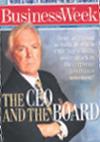O Reilly and accountability - Business Week

The prestigious American magazine published a critique of O'Reilly as CEO of Heinz raising virtually the same issues now being pushed by Denis O'Brien.
On 15 September 1997 the cover story of America's prestigious business magazine, Business Week, featured Tony O'Reilly. That story of a decade ago raised issues very similar to those being pursued by Denis O'Brien now.
The story began: “It was, as always, an extravagantly festive event. On 10 August, some 500 guests of HJ Heinz Chairman and Chief Executive Anthony JF O'Reilly gathered under chandeliers in a mammoth white pavilion set up at the swanky Leopardstown horse-racing track outside Dublin. More than half were flown in from around the world, put up at Ireland's finest hotels, and feted at a lavish three-day bash. Guests included HJ Heinz Co executives and directors, Wall Street analysts, and assorted politicians, tycoons, and friends.
“From a gala ball at O'Reilly's own Georgian mansion to the main event, the Heinz 57 Phoenix Stakes, no expense was spared. And with Heinz picking up the tab, O'Reilly was clearly the star of the show”.
It noted O'Reilly had become “the next target of activist investors leading the corporate governance movement” and continued: “O'Reilly's performance, unhappy shareholders such as Teachers Insurance & Annuity Assn. - College Retirement Equities Fund (TIAA-CREF) and California Public Employees' Retirement System (CalPERS) believe it is a textbook example of what a board should not be: a cozy club of loyalists headed by a powerful and charismatic chieftain”.
Referring back to the Leopardstown party, it stated: “Critics believe a stronger board would likely rein in his free-spending ways. O'Reilly's lavish bash was the 15th in a row, for example, even though Heinz is in the midst of laying off 2,500 employees.
“To many observers, Heinz could well be a poster child for poor corporate governance. For its size and prominence, the company stands nearly alone in its failure to meet many of the new guidelines. In Business Week's first ranking of corporate boards, published last November, Heinz' was the third worst in the US.”
Commenting on how Heinz, which had performed spectacularly when O'Reilly first took charge, had become a poor corporate performer in his later years there: “Since the start of the decade, operating earnings have grown 43 per cent; by contrast, rival Campbell Soup Co. has increased its income by 140 per cent, to a projected $1.5 billion for fiscal 1997. And over the past five years, Heinz' annual shareholder returns of 13.9 per cent have consistently underperformed the S&P, as well as the S&P food index.
“Nevertheless, the Heinz board continues to pay O'Reilly like a superstar. His total compensation of $182.9 million in the past six years ranks him among a handful of the best-paid CEOs. In five of those six years, he has won the dubious distinction of being among the five CEOs cited by Business Week as giving shareholders the least for their money.
Commenting on the “crony” board, it stated: “Heinz' board remains loaded with insiders. Ten of the 19 board members are current or former Heinz employees. Governance experts believe that having so many insiders lends too much support for O'Reilly... As if that weren't enough, Heinz' board is overloaded with aging directors... Just as jarring is the fact that most of the outside directors who gather around the sierra chica granite table in Heinz' windowless boardroom are longtime colleagues or friends of O'Reilly, and not one outsider is a sitting CEO.
